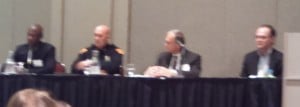 I’m still slowly reading my way through Karen Armstrong’s Twelve Steps to a Compassionate Life. Our city discussion group has held two monthly meetings, but yesterday I was reading Step Eight – How We Should Speak. There it was that I learned of something from the field of linguistics, called the principle of charity. The principle says that when someone says something to us which seems strange, we should pause, assume that they hold some piece of truth which might be useful to us, and accept that even if our belief systems differ, we both have some shared notion of “truth.”
I’m still slowly reading my way through Karen Armstrong’s Twelve Steps to a Compassionate Life. Our city discussion group has held two monthly meetings, but yesterday I was reading Step Eight – How We Should Speak. There it was that I learned of something from the field of linguistics, called the principle of charity. The principle says that when someone says something to us which seems strange, we should pause, assume that they hold some piece of truth which might be useful to us, and accept that even if our belief systems differ, we both have some shared notion of “truth.”
With trolls lined up to pour vitriol on every blog with comments allowed, with extremists of every persuasion shrilly filling the airwaves, this kind of openness can be more of a challenge than we may be willing to take on. Don’t most of us already know what our ideological “opponents” think, anyway? Why waste our time engaging with people who think they know it all (subtext here is that I know better than they, oops, I’m a know it all, too!).
Armstrong reminds her readers of something historians know well, which is that fundamentalism of any sort is rooted in a deep fear of annihilation, a reaction against a society which appears to be assaulting established values. Whenever there has been a significant fundamentalist movement, it’s pretty much always embedded in a culture or government or social group which is undergoing rapid change. Most recently in America, I recall the rise of the Christian Right as a political movement just a decade or so after the shocking-to-some turmoil of the 60s and early 70s.
 So often I see Pagans trying to explain to others who are religiously-conservative just why our spirituality is valuable and beautiful and not wicked. Having been a hippie Jesus freak myself back in the day, I am well aware that this is a completely fruitless endeavor. Armstrong offers a much more amenable, and hopefully useful, tool for us to try. She says:
So often I see Pagans trying to explain to others who are religiously-conservative just why our spirituality is valuable and beautiful and not wicked. Having been a hippie Jesus freak myself back in the day, I am well aware that this is a completely fruitless endeavor. Armstrong offers a much more amenable, and hopefully useful, tool for us to try. She says:
“Instead of trying to bludgeon other people into accepting our own point of view, we may need to find a way of posing Socratic questions that lead to personal insight rather than simply repeating the facts as we see them yet again.” (p. 136)
She goes on to say that “we should make a point of asking ourselves, whether we want to win the argument or seek the truth, whether we are ready to change our views if the evidence is sufficiently compelling . . .” (p. 136) Now, here is a real challenge! Are we actually willing to take part in a conversation in which we reject some part of our own convictions and accept a new way of viewing reality?
I want to write more about how we implement this principle of charity in another column on “deep listening.” Stay tuned.
















